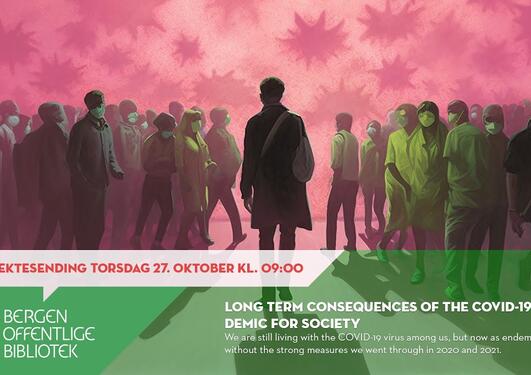Successful first international conference at the Pandemic Centre
Friday 27th of October the Pandemic Centre at UiB celebrated 3 years of existence by inviting to the first international conference. The topic for this year's conference was long term consequences of the covid-19 pandemic.
Main content
Both researchers, organizations, policy makers and other people interested were invited to the Bergen Public Library for a one day conference on the long-term consequences of the covid 19-pandemic. This was the centre's third conference, having previously organized a student's conference and a national conference last year.
Three years since the world was hit by the coronavirus, many lessons have been learned. Early on, the covid 19-pandemic raised questions about everything from economical impact, job-flexibility, psychological effects of lockdowns and government trust. Also legal issues related to lockdowns, vaccine enforcement and vaccine passes were many.
The aim of the conference was both to discuss the good and bad experiences and to raise awareness about the preparedness for the next pandemic or big crisis.
Across institutions
Topics included the historical perspective of pandemics, necessary changes post-pandemic, implementation of lessons learned, and applying these lessons to other global crises.
The conference was opened by rector at UiB, Margareth Hagen. She put emphasis on the importance of working across institutions to adress the pandemic. As an example, she mentioned the health-ambassador project initiated by the Pandemic Centre. In this project, the centre collaborated with the municipality and Caritas to provide information about the pandemic in different ethnic communities in Bergen.
«Through this initiative, we managed to disseminate important medical information to groups who were over-represented in infection statistics. However, to do so the work needed to be interinstitutional», said Hagen.
International speakers
Among the two key-note speakers were Dr Sylvie Briand, Director of the Epidemic and Pandemic Preparedness and Prevention department (EPP) at the World Health Organization’s (WHO). EPP develops global strategies to prevent and control epidemics and pandemics such as COVID 19, monkeypox, Zika, Influenza and several other emerging pathogens with pandemic potential.
Dr. Briand was unfortunately not able to be at the conference in person, but shared her valuable knowledge and insights through an online presentation.
The other key-note speaker was Dr. Erica Charters, Professor of the Global History of Medicine, University of Oxford. She drew interesting historical lines and presented findings from her ongoing multidiciplinary project on covid-19 and how epidemics end.
In addition, students from the PhD-course at the Pandemic Centre contributed with short presentations. After a coffee-break and posters, it was time for parallell sessions. The sessions included both panel-debates such as "What would a post-pandemic city look like?" and a number of interesting presentations from researchers from other institutions.
The conference ended with a plenary session in the auditorium discussing the lessons learned, but yet to be implemented. Head of the Pandemic Centre, Esperanza Diaz, then held the closing remarks and thanked everyone involved for another sucessful event.
The whole conference was streamed live and can be seen here: https://www.youtube.com/watch?v=zDdpseuTo-U






















